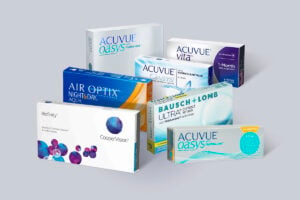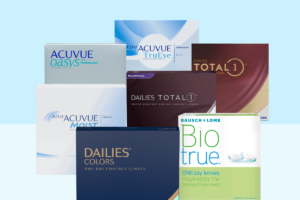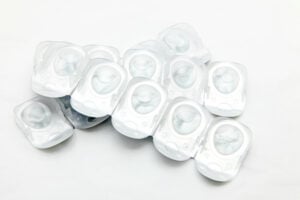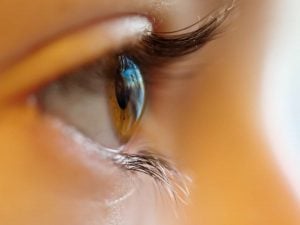Various types of contact lenses are fitted for different situations and people. These include:
- Soft lenses. They’re the most common type of contact lens and the easiest to get used to.
- Rigid gas permeable (RGP). These are less common and can take a bit more getting used to.
- Toric lenses. A special type of contact lens for people with astigmatism.
- Multifocal contact lenses. Multifocal contact lenses are available for people with presbyopia.
- Colored lenses. Soft lenses with a tint that can have your prescription.
Let’s discuss how and where you can get contact lenses, care guidelines, and replacement schedules to keep in mind. We’ll also go over factors to consider when getting contact lenses.
How To Get Contact Lenses
If you want to get contact lenses, you’ll need a contact lens exam. During the exam, an optometrist or ophthalmologist will check your eye’s overall health to check your prescription, fluid pressure, and potential eye infections or conditions.
Your doctor will also measure your corneal curvature, pupil size, and tear film quality. A flat or steep lens will be uncomfortable to wear and won’t correct your vision properly.
These measurements will help your eye doctor determine whether or not you should wear contact lenses. They will also discuss your lifestyle to determine a healthy wear and replacement schedule.
What Are Contact Lens Prescriptions?
Prescriptions determine what type of contact lenses you need and are required to buy contacts legally and safely. After your eye exam, you will receive a prescription for a specific type, size, and power of contacts.
On your prescription, you’ll see the following elements:
| OD | Stands for oculus dexter and refers to the right eye |
| OS | Stands for oculus sinister and refers to the left eye |
| POWER (PWR) or SPHERE (SPH) | Refers to your prescription’s refractive power or strengthThe (-) indicates nearsightedness and the (+) indicates farsightedness |
| Cylinder (CYL) | Measures the amount of astigmatism correction |
| AXIS | Measures the direction of astigmatism correction |
| B.C. | Stands for the base curve and measures the inside of a contact lens’ curvatureThe number is usually between 8 and 10 |
| DIA | Represents the diameter of the lens or width from edge to edge and determines where the contact sits on your eye |
You’ll receive separate prescriptions for your eyeglasses and contact lenses. Be sure to ask your eye doctor for a copy of each, especially if you purchase contacts or glasses online.
Where to Buy Glasses + Contacts
Best Overall: Warby Parker
Fastest Delivery: EyeBuyDirect
Also Great: Liingo
Best Place to Buy Contacts: Discount Contacts
Where to Get Contact Lenses
For contact lenses, you can go to big stores like Target Optical or Costco. The prices are typically good, but the selection might be smaller than that of a dedicated eye doctor.
Meanwhile, many online options are available at stores like Warby Parker and Hubble. However, you’ll need to send them a prescription from your doctor.
Lastly, the most convenient way to get contact lenses is from your doctor. Many eye doctors will then give you a free trial pair of contacts to test out for a week or two. They can also recommend which type and brand are best for you.
Wear and Replacement Schedule
Soft contact lenses often come with a recommended wear routine and replacement schedule:
- Daily disposable lenses. Worn for one day and discarded. You won’t need a case or cleaning solution.
- Bi-weeklies. Replaced every 15 days.
- Monthlies. Must be replaced every 30 days.
The Food and Drug Administration (FDA) has approved extended-wear contacts for overnight use. Most can be worn for seven days and six nights, but Air Optix Night & Day lenses are approved for 30 days and nights.
Follow the replacement schedule to avoid complications. If your contacts feel ripped, uncomfortable, or painful, we strongly advise taking them out and seeing a doctor immediately.
How to Take Care of Contact Lenses
Before handling contact lenses, wash your hands and dry them with a lint-free towel to avoid getting lint on them. Use a fresh solution to clean your contacts by gently rubbing them to remove gunk.
Don’t use tap water or saliva to clean your contacts. Be sure to use a fresh solution when storing and disinfecting them. Never reuse or top off an old solution.
You should clean the lens case with sterile contact lens solutions and let it air dry. Replace the case every three months.
Lastly, be careful when handling your contacts, especially if you have long nails. Remember to remove them before swimming or showering to avoid an infection.
Factors To Consider When Getting Contact Lenses
Although contacts are effective at correcting vision problems, they can sometimes be inconvenient. So before you get contacts, here are some things you might want to consider:
- Lifestyle. If you’re busy or travel a lot, disposable contacts may be easy for you. Meanwhile, the more secure lens type might be better for active/sporty people.
- Material. Your comfort with contact lenses partly depends on the material they are made of. Modern lenses are typically comfortable, but some may be sensitive to the material.
- Cost. Contacts can range from $20 to $100, and disposable lenses become more expensive over time.
If you’re worried about the cost, check your insurance policy to see if it covers the eye exam or some of the lenses themselves. Some places even offer “newbie packs” with trial sizes and cleaning supplies to get you started.
However, you should beware of lenses that are way too cheap, especially from sketchy websites without doctor verification. These can be ineffective or potentially harmful.
Why Should You Get Contact Lenses?
Contact lenses are great if you want to stop wearing glasses. They can even help you participate in activities without worrying about your glasses falling off.
But most importantly, they help address refractive errors like:
In this article
Best Places to Buy Contacts
Best Overall

Discount Contacts is our #1 recommendation to buy contacts online.
Also Great

GlassesUSA has a huge selection of contacts, glasses, & sunglasses.
Best Places to Buy Glasses
Best Overall
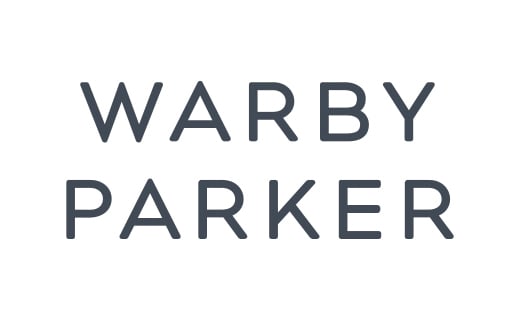
Warby Parker has stylish, high-quality frames at affordable prices.
Also Great

Liingo Eyewear is another great option to buy glasses online.
Best on a Budget

EyeBuyDirect has a wide variety of budget frames starting at $6.


